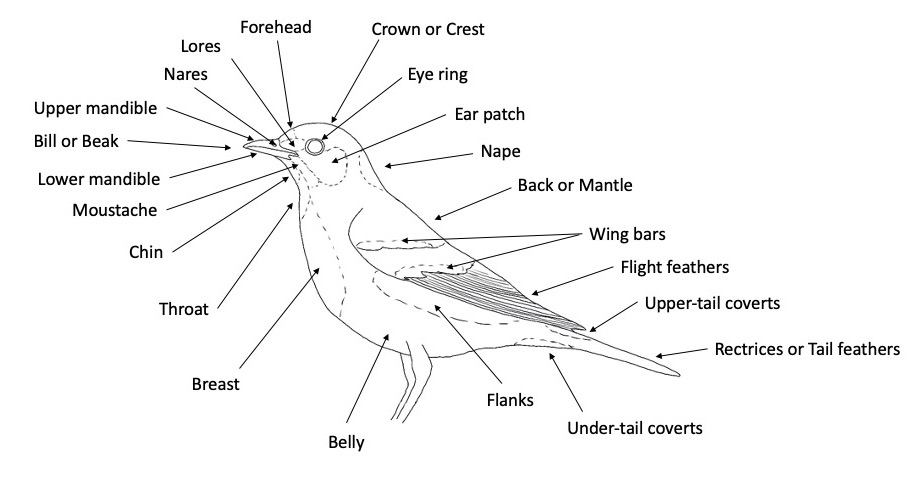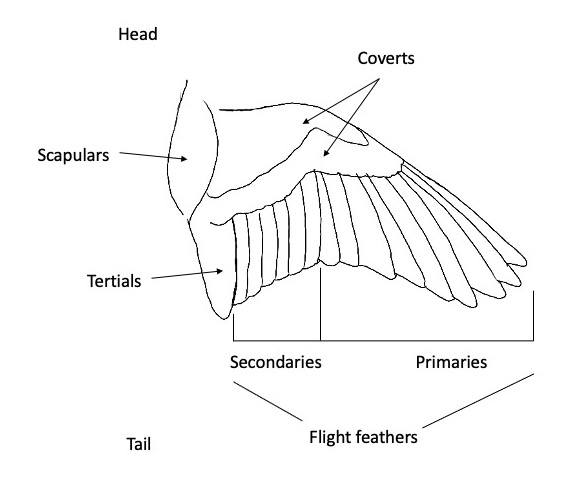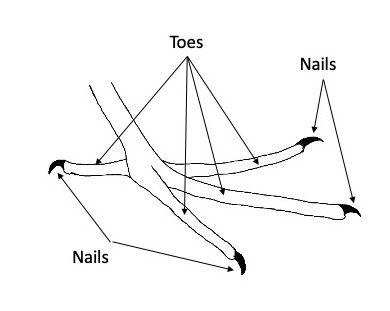- Home
- Glossary
Glossary of Bird Terms
Some of the terminology used with birds can seem odd to a beginner. Part of the reason is that some of the terms go way back into the mists of time. The origins of some of the terms are lost to history. But, knowing the terminology is important to understanding birds. I once had a professor who told me the first step in learning any topic is mastering the language of the topic. And so, here is our glossary to bird terms to help you learn.
Continue on with terms broken out by topic. Click here for an alphabetical list.
Parts of the Bird

Head Area
Beak - also called Bill - mouth of a bird
Bill - also called Beak - mouth of a bird
Chin - small area immediately below the Bill
Crest - set of elongated Contour Feathers on the top of the head
Crown - top of the head
Ear Patch - small patch of feathers covering the ear opening, found behind the eyes
Eye Ring - small circle of contrasting color around the eye; may be complete or partial
Forehead - small area between the Bill and the Crown
Lores - small area between the Bill and the eye
Lower Mandible - bottom half of the Bill
Moustache - narrow band of contrasting color extending from the Bill or Chin down the side of the neck
Nape - back of the neck, between the Crown and the Back
Nares - nostril openings on the Bill
Supercilium - also known as Eye Line - narrow band of color above the eye; may be short or may extend to the back of the head
Throat - area below the Bill, between the Chin and the Breast
Upper Mandible - upper half of the Bill
Wing

Coverts - Contour Feathers that cover the leading part of the wing; found on both the underside and the upper side of the wing
Flight Feathers - stiff feathers along the training edge of the wing; provide the lift on a downstroke of the wing that keeps a bird in the air
Primaries - outermost Flight Feathers; stiffer than Secondaries; provide most of the lift during flight
Remiges - see Flight Feathers
Scapulars - small section of Contour Feathers near where the wing attaches to the body; found only on the upper side of the wing
Secondaries - innermost Flight Feathers; not as stiff as Primaries
Tertials - small section of Contour Feathers between the Secondaries and the body
Wing Bars - one or two small areas of lighter color, often white, seen on the wing when folded
Wing Patch - large area of contrasting color on a wing when outstretched
Body
Back - upper part of the main body; between the Nape and the tail
Belly - lowest part of the body, between the tail and the Breast
Breast - on the underside of the body, between the Throat and the Belly
Contour Feathers - stiff feathers that cover the body; not as stiff as the flight or tail feathers, but have more structure than Down
Down - soft feathers with little or no structure, found underneath the Contour Feathers; provide insulation
Flank - side of the body below the wing
Mantle - another name for the Back
Tail Area
Outer Tail Feathers - the two tail feathers (one of each side of the tail) that are on the outside edge of the tail
Rectrices - also called Tail Feathers - the long and stiff feathers in the tail; used to aid in steering while in flight; a single tail feather is called a rectrix
Undertail Coverts - Contour Feathers on the underside of where the tail attaches to the body; may be a contrasting color on some bird species
Uppertail Coverts - Contour Feathers on the upper side of where the tail attaches to the body; may be a contrasting color on some bird species
Vent - area near the tail where a bird excretes waste, or “poops”
Foot and Toes

Hallux - for most birds, like the American Robin, the toe that points to the rear (while the other three point forward)
Nails - sharp projections from the toes; comparable to our fingernails; called Talons when on hawks and owls
Toes - part of the foot that a bird actually stands on
Nesting
Cavity Nest - a nest built into a hole, or cavity, in a tree, post, or pole
Clutch Size - the number of eggs in a nest
Incubation Period - the length of time between when an egg is newly laid and when a baby bird hatches from it
Open Cup Nest - a nest built by weaving together strands of vegetation (like grass and twigs) into a circular cup-shaped nest; generally open above, although some species will weave a cover
Nest Parasite (also called brood parasite) - a species of bird that doesn’t build its own nest, but instead lays its eggs in the nest of another bird; it counts on the “host” bird to raise its young
Nestling Period - the length of time a baby bird stays in the nest
Flight
Gliding - when gliding birds do not flap their wings and they lose altitude; contrast with Soaring
Powered Flight - flight with active wing beats
Soaring - flight without flapping their wings, but use the atmosphere and rising air currents to either not lose altitude or to rise higher in the air; contrast with Gliding
Alphabetical Glossary of Bird Terms
Back - upper part of the main body; between the Nape and the tail
Beak - also called Bill - mouth of a bird
Belly - lowest part of the body, between the tail and the Breast
Bill - also called Beak - mouth of a bird
Breast - on the underside of the body, between the Throat and the Belly
Cavity Nest - a nest built into a hole, or cavity, in a tree, post, or pole
Chin - small area immediately below the Bill
Clutch Size - the number of eggs in a nest
Contour Feathers - stiff feathers that cover the body; not as stiff as the flight or tail feathers, but have more structure than Down
Coverts - Contour Feathers that cover the leading part of the wing; found on both the underside and the upper side of the wing
Crest - set of elongated Contour Feathers on the top of the head
Crown - top of the head
Down - soft feathers with little or no structure, found underneath the Contour Feathers; provide insulation
Ear Patch - small patch of feathers covering the ear opening, found behind the eyes
Eye Ring - small circle of contrasting color around the eye; may be complete or partial
Flank - side of the body below the wing
Flight Feathers - stiff feathers along the training edge of the wing; provide the lift on a downstroke of the wing that keeps a bird in the air
Forehead - small area between the Bill and the Crown
Gliding - when gliding birds do not flap their wings and they lose altitude; contrast with Soaring
Hallux - for most birds, like the American Robin, the toe that points to the rear (while the other three point forward)
Incubation Period - the length of time between when an egg is newly laid and when a baby bird hatches from it
Lores - small area between the Bill and the eye
Lower Mandible - bottom half of the Bill
Mantle - another name for the Back
Moustache - narrow band of contrasting color extending from the Bill or Chin down the side of the neck
Nails - sharp projections from the toes; comparable to our fingernails; called Talons when on hawks and owls
Nape - back of the neck, between the Crown and the Back
Nares - nostril openings on the Bill
Nest Parasite (also called brood parasite) - a species of bird that doesn’t build its own nest, but instead lays its eggs in the nest of another bird; it counts on the “host” bird to raise its young
Nestling Period - the length of time a baby bird stays in the nest
Open Cup Nest - a nest built by weaving together strands of vegetation (like grass and twigs) into a circular cup-shaped nest; generally open above, although some species will weave a cover
Outer Tail Feathers - the two tail feathers (one of each side of the tail) that are on the outside edge of the tail
Powered Flight - flight with active wing beats
Primaries - outermost Flight Feathers; stiffer than Secondaries; provide most of the lift during flight
Rectrices - also called Tail Feathers - the long and stiff feathers in the tail; used to aid in steering while in flight; a single tail feather is called a rectrix
Remiges - see Flight Feathers
Scapulars - small section of Contour Feathers near where the wing attaches to the body; found only on the upper side of the wing
Secondaries - innermost Flight Feathers; not as stiff as Primaries
Soaring - flight without flapping their wings, but use the atmosphere and rising air currents to either not lose altitude or to rise higher in the air; contrast with Gliding
Supercilium - also known as Eye Line - narrow band of color above the eye; may be short or may extend to the back of the head
Tertials - small section of Contour Feathers between the Secondaries and the body
Throat - area below the Bill, between the Chin and the Breast
Toes - part of the foot that a bird actually stands on
Undertail Coverts - Contour Feathers on the underside of where the tail attaches to the body; may be a contrasting color on some bird species
Upper Mandible - upper half of the Bill
Uppertail Coverts - Contour Feathers on the upper side of where the tail attaches to the body; may be a contrasting color on some bird species
Vent - area near the tail where a bird excretes waste, or “poops”
Wing Bars - one or two small areas of lighter color, often white, seen on the wing when folded
Wing Patch - large area of contrasting color on a wing when outstretched